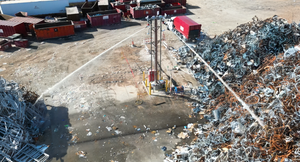Nova Scotia, Canada, Moves to OK Thermal Disposal of Plastic, Cardboard
However, critics argue the province is failing to take the lead on the reduction and elimination of single-use plastic and producer responsibility.
After a 2017 waste audit by Divert Nova Scotia in Canada found that 43 percent of garbage sent to landfills is banned material that could have been composted or recycled, the province is moving to allow plastic, cardboard and newsprint to be used in waste-to-energy (WTE) plants. However, according to a Halifax Today report, a Halifax environmental group believes this is a move in the wrong direction.
Nova Scotia’s Environment Department said the changes to the solid waste regulations are about "allowing new solutions" to reduce waste in landfills, according to the report. The province also considers energy recovery as waste diversion. The department also says recyclable materials will still be banned from landfills, while WTE facilities will still need all of the required environmental assessment and industrial approvals.
But critics claim the province is failing to take the lead on the reduction and elimination of single-use plastic and extended producer responsibility, where companies that make plastic products are responsible for taking it back and reusing it or recycling it.
Halifax Today has more details:
Nova Scotia is moving to allow plastic, cardboard and newsprint to be used in waste-to-energy plants — a move a Halifax environmental group says is "doubly disappointing."
Environment Minister Margaret Miller said the changes to solid waste regulations announced Wednesday will give businesses an opportunity to "create something useful from waste destined for landfills."
"Now the materials that would normally go to landfills, that we know 43 per cent of it is non-approved items ... this means that material will be able to go to a waste-energy program," Miller said in an interview.
About the Author
You May Also Like


.png?width=300&auto=webp&quality=80&disable=upscale)